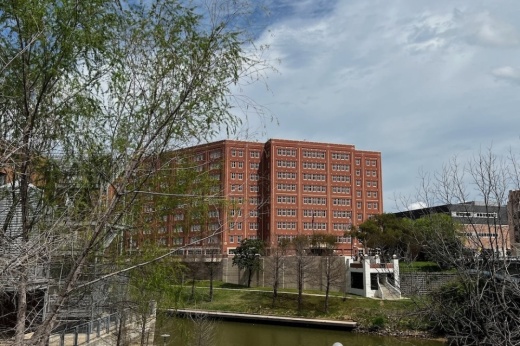When describing March data from the Harris County jail population dashboard, Jason Spencer, the chief of staff from the sheriff's office, equated the inmate count to one that was greater than the population of more than 200 cities in Texas.
"We have a city inside of a city that's not the healthiest of populations," Spencer said.
By the numbers
"The primary reason why we have struggled for the last couple of years to be in compliance with the state's jail standards is lack of staffing and not enough detention officers. Our detention officer-to-inmate ratio is out of whack, so we've had to outsource," Spencer said.
Since late 2023, officials with the office of county administration established the protocol that included updating the public with monthly jail updates. At the March 25 media meeting and March 26 commissioners court meeting, both Spencer and Tonya Mills with county administration described how the county is struggling to manage its overcrowded jails.
Factors included inadequate staffing, specialty inmate populations which require a higher level of supervision than the standard general population and the challenges faced with staffing a facility that operates 24 hours a day, 7 days a week.
Mills said an exceptionally high number of people in custody are in a preadjudication status, or pretrial status, accounting for 73% of the people in custody, she said. Mills said those waiting longer for trial or to be seen by a judge has a negative impact on the overall jail population.
The jail was designed for short-term stays, Spencer said.
"It would be like if you moved into a motel and to live there for over a year. It's not designed for that," he said.
Spencer said the infrastructure doesn't allow the opportunity for outdoor recreation, privacy or programming, which creates a tense environment for inmates.
"It's a more tightly wound population that is also disproportionately more violent than what we had in the past because of what we talked about earlier, where the people who are in our jail are there for very serious charges as opposed to prebail reform," he said.
The tense environment also trickles down to the detention officers working at the jail, Spencer said.
"When you see a high turnover rate, a difficulty retaining officers in the job, you start to kind of understand why it's a tough place to work under the best of circumstances," he said. "With a population that's been there longer than a facility was designed to accommodate them, [officers] working forced overtime, ... it's not sustainable. People burn out quick, so it's just this vicious cycle we're in."
Within the inmate population includes those who need specialty care and have to be housed at alternative facilities before they can be at the jail, officials said. Michael Hill is the senior vice president at Harris Health, which is the county's health care system that also operates in the county jails.
Hill said that over 60% of the inmate medical screenings result in either a medical provider or a mental health provider having to see the inmate before they can be housed in a facility. He told commissioners at the March 26 meeting his No. 1 priority for medical help in the jails is to improve medication intake time, or administer medications immediately. He also said another priority was to give inmates access to care—decreasing the waiting period to seek care from 14 days to 10 days.
The action taken
After Harris County commissioners heard the county jail presentation at the March 26 commissioners court meeting, they addressed questions and concerns to Mills, Spencer and Assistant Chief Phillip Bosquez with the sheriff's office.
Precinct 4 Commissioner Lesley Briones asked the county staff for a more "drilled-down" update on the number of staffing vacancies and health services. County officials were tasked with providing an update at the April commissioners court meeting.
Also of note
Precinct 2 Commissioner Adrian Garcia wanted to know what more the county could do, legally, to send inmates who are fully vetted to state prisons.
Mills said the average days to transfer inmates is increasing. Mills also said that while transferring inmates to out-of-state facilities may provide temporary relief and that court cases are beginning to process faster, it doesn't address the underlying problem.
"It's going to get worse before it get's better unless there's some relief with the state," she said.





